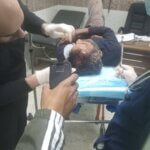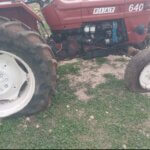25 market stalls devastated by Occupation troops in the Jordan Valley in one day
On Tuesday 12 August, at least 25 market stalls owned by Palestinian farmers were demolished by Israeli Occupation Forces in the Jordan Valley.
For many Palestinian farmers in the area, selling their produce to transiting drivers is one of the main sources of income in a region isolated from other areas inside the Green Line, the rest of the West Bank and Jordan Valley by the Wall, checkpoints, trenches and closed military zones.
Palestinians were not allowed to remove tomatoes, peppers, egg plants and a variety of fruits from under the simple market stalls, put up to provide shelter from the burning mid-summer heat, before a bulldozer crushed them together with all the produce and equipment still inside. Later on, a crane loaded the wreckage onto a truck before heading for the next target. Whatever remained of the market stalls was confiscated and carried away by the army. In Zubeidat a market booth was set on fire.
The Palestinian stall owners suffered severe economic damage. One of them witnessed 85 large boxes of fresh fruit and vegetable being crushed by the Occupation’s bulldozer. In addition to the destruction of their products, the confiscation of all their equipment will make it difficult for the villagers to reopen their stalls.
This latest attacks on Palestinian market stalls along Road 90 comes only 2 days after Occupation officials assured the owners that they would be provided with electricity. After witnessing a number of similar attacks and demolitions in recent weeks and months, the villagers’ hopes that the Occupation would finally recognize their right to sell their products in shops located on lands they own were crushed this morning.
“The next time we will keep you and the camera”
Representatives of the UN-OCHA were present during the demolitions and witnessed also a Palestinian human rights activist having his video camera confiscated. Fathy Khadarat, the coordinator of the Jordan Valley Solidarity campaign, had his ID confiscated and was photographed by the Occupation forces. Despite the fact that several human rights organizations informed of the incident immediately protested to the Occupation authorities, the video camera and footage were returned only after 3 hours. Finally, Fathy Khadarat was threatened with arrest if he should continue to document the violations of international law committed by the Occupation.
The large scale devastation of market stalls is a further attack on the few remaining sources of income for Palestinians in the isolated eastern border strip of the Occupied West Bank. It comes at a time, when several Israeli settlements in the same area are expanding. In the northern Jordan Valley, the colony of Rotem usurped additional Palestinian lands by fencing them off, while at the army site of Maskiot the establishment of the first new settlement in ten years has been approved by high ranking Occupation officials. Close to the Hemdat settlement, in Khalit Mak’houl, the establishment of a vast firing range has been announced to Palestinian Bedouin communities, currently under imminent threat of eviction. In Jiftlik, the Massu’a settlers demanded the Palestinian community living across the street be evicted to establish further green houses on Palestinian owned land: these simple Palestinian homes have been promptly served with demolition orders by the Occupation authorities. In addition, eviction threats remain high in the communities of Farisiya, Humsa and Hadidiya.
Settlement expansion, the confiscation of land and water, and the restriction of movement for Palestinians are elements in a set of policies aimed at the destruction of Palestinian livelihood in the Jordan Valley. They are part of a wider scheme to drive the Palestinian population out of a region that after 40 years of Occupation contains the smallest number of inhabitants per square kilometer. The Jordan Valley with its fertile soil, its rich water resources and strategic location is a prime target for the Occupation’s annexation plans.
After the Occupation has successfully severed ties with local and foreign markets, selling vegetable on Road 90 is one of the few remaining sources of income for Palestinian farmers in the Jordan Valley, a region sealed off from the rest of the occupied West Bank, the areas on the other side of the Green Line and neighbouring Jordan Valley by the Wall, trenches, checkpoints and vast military closed zones.




